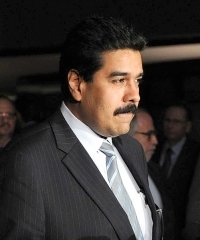Nearly seven months after a highly contentious presidential election, Venezuela’s political, economic, and social future is increasingly uncertain. On November 8, President Nicolás Maduro ordered the “occupation” of an electronics store chain followed by a call for “Bolivarian militias” to flood the streets to crack down on the “right- wing’s fascist economic war.” Security forces are enforcing orders, bringing tensions to a new limit and raising the potential for large- scale violence. The National Assembly is likely soon to grant Maduro the power to rule by decree to fight corruption, which would give him new tools to go after his critics and imprison business leaders. As the December 8 municipal elections approach, the economy continues its downward spiral with inflation reaching 54 percent in October.
“I have ordered the immediate occupation of that chain of stores and the sale of goods at a fair price. Let’s not leave anything on the shelves, nothing in the warehouses.”
—President Nicolás Maduro in announcing actions against Daka electronics stores, November 8, 2013
How might the volatile situation unfold in Venezuela?
Scenario 1
Government foresees a significant loss in the December 8 municipal elections.
With elections approaching, polls indicate that the opposition could be poised for a major victory in the upcoming elections. This makes the short-term, pre-election scenario increasingly problematic. Recent economic measures taken against business interests (beginning with the November 8 actions against electronics stores) may be just the beginning of Nicolás Maduro’s attempts to assert increasingly widespread control. Why is Maduro doing this now? Creating disorder, ramping up tensions, and invoking fear may be an attempt to: (a) scare and suppress opposition voters ahead of the elections
Recent economic measures taken against business interests may be just the beginning. |
or (b) generate chaos that would force a postponement or cancelation of the elections. The expected passage of the enabling law would allow him to take additional extraordinary measures against opponents. Maduro may ramp up political persecution of opposition leader Henrique Capriles Radonski as well as other opposition figures and the Primero Justicia political party. Chaos on the streets would force a tough response leading to the government becoming further entrenched and its political power—assuming it can balance fear with order—increasingly solidified.
International Response: The Venezuelan government would become increasingly isolated with the loss of democratic aura and would seek to mobilize support from the Alianza Bolivariana para los Pueblos de Nuestra América (ALBA) countries. This scenario would be a critical moment for Brazil to show its leadership in the hemisphere and use its clout with the Venezuelan government to push for a return to some semblance of democratic order.
Scenario 2.
Municipal elections occur with the popular vote split between government-supported candidates and the opposition.
If the popular vote is essentially even—as it was in the April presidential elec- tion—then Henrique Capriles may face a challenge to his role as leader of the opposition. Capriles has very effectively united a traditionally split
Capriles may face a challenge to his role as leader of the opposition. |
opposition but new leaders may begin to emerge if patience wanes with the opposition’s ability to deliver ballot box results. With a split popular vote, the government will emerge from what is essentially a referendum on the eight months since the last election in a stronger position. It will be forced to make difficult economic decisions but will do so knowing that it can weather the challenges of a potential devaluation. A stronger hand could provide the impetus for continued political radicalization as Maduro seeks to solidify his hold on power and put loyal ministers and advisors around him.
International Response: Venezuela’s influence in regional affairs would increase once it becomes clear that the Maduro government has improved its domestic base—or at least maintain support without the Chávez sympathy votes. Mercosur member countries should encourage the Venezuelan government to loosen controls leading to record inflation and shortages. Petrocaribe beneficiaries except Cuba could see a roll back in their oil subsidies.
Scenario 3
Municipal elections occur but the opposition wins the popular vote by more than three percentage points.
An opposition victory on December 8 would threaten Maduro’s power while strengthening Capriles as the opposition leader. One result could be increased divisions within the ruling Partido Socialista Unido de Venezuela (PSUV)
A strong opposition showing could increase the danger of an interruption of democracy. |
with Maduro becoming increasingly radical as a tactic to consolidate power in the face of intraparty threats. The Venezuelan president could also step up persecution of the opposition to unite his party while seeking international scapegoats for the fragile domestic economy. The government would move to control political risks before attempting any economic stabilization. A strong opposition showing could increase the danger of an interruption of democracy. Building on the momentum of a strong showing, the opposition could seek to hold a vote in 2014 in the form of a congressional recall or constitutional referendum.
International Response: Similar to the first scenario, the Venezuelan government would quickly become isolated beyond its traditional regional allies. But even so, chances are not good for much serious international concern. Brazil (busy with internal protests), Colombia (focused on peace nego- tiations with the FARC), Chile (in the middle of elections), Mexico (worried about reforms), the US (with all eyes on the Middle East) and regional institutions that lack the clout to influence the on-the-ground situation diminish the chances that Venezuela will be elevated in importance. Unfortunately, without a substantial eruption of violence, the region is not likely to react.
The Spotlight series, produced by the Atlantic Council’s Adrienne Arsht Latin America Center, provides a look ahead at critical issues for Latin America and beyond with potential scenarios for decision-makers to consider in policy formulation.
